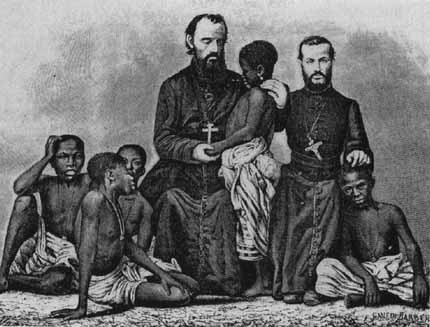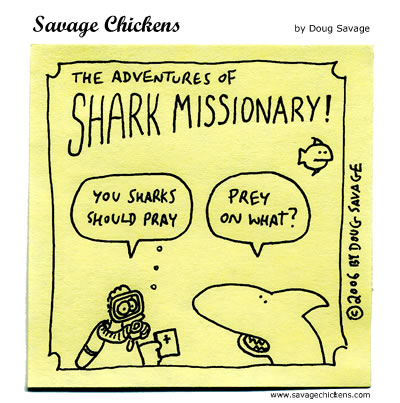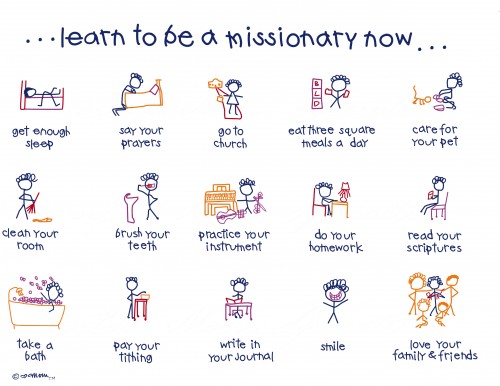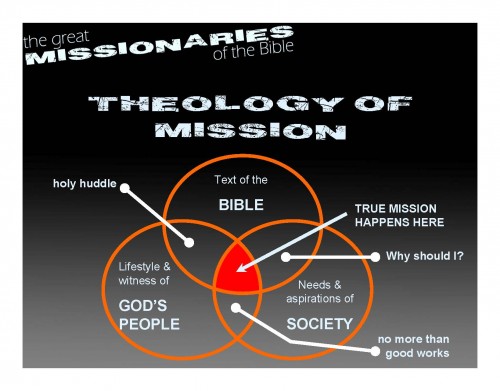 Print This Post
Print This Post
This morning we start a new series of Sunday morning teaching sessions.
I wonder what your idea of a missionary is? Earlier in the 20th century this was the headline image on a missionary magazine
By current standards this contains some strongly politically incorrect messages – the powerful white man (he’s the largest in the picture and he’s dressed in clerical garb) is surrounded by little black children (or are they adults?) sitting around him in adoring wonder. The second cleric has his hand on the head of the native in a classic power-submission pose. Hmmm…
Or this one …
Or if you wish you can buy a pillow with this image on it.
So if you forget what a missionary does in the middle of the night you can get a reminder!
So what is ‘mission’? And why are we so concerned about it? Why is it part of our church’s very reason for existing?
Mission, at its heart, is bringing God’s life transforming message of Jesus Christ to the world of people he has made and whom he love so passionately.
I want to start with a
Theology of mission.
Mission essentially brings three things together Which I’ll illustrate with three rings (The Olympics have their 5 rings, the paralympics have their 3 agitos – so we’re going to have 3 rings!)
The first is
the scriptures <ppt>
We are people of the book, not just of any book but the Bible as the revealed and authoritative word of God.
- The Bible is the Word of God in the words of men and therefore it carries an innate authority that other literature doesn’t.
The scriptures reveal who Jesus Christ is and the wonder of who he is. It is him we are following, not a religious system.
When Paul was talking to Timothy, his prodigy, he said this
2 Tim 3:16-17 All Scripture is God-breathed and is useful for teaching, rebuking, correcting and training in righteousness, so that the man of God may be thoroughly equipped for every good work.
Alongside the scriptures goes
the lifestyle and witness of God’s people. <ppt>
When Jesus commissioned his followers he said “go and make disciples”.
- Go out and work with people, minister to them, teach them, baptise them and help them to grow – in such a way that they will progressively more like Me, Jesus Christ, God’s Son.
- That’s why it is so sad when we come across situations where the behaviour of God’s people contradicts the message of the Bible. Or a church which preaches the good news, but is the bad news!
When Paul was writing to Timothy he went on to say this
1 Tim 4:12 Don’t let anyone look down on you because you are young, but set an example for the believers in speech, in life, in love, in faith and in purity.
Then there are
the needs and aspirations of society <ppt>
The society where the Lord has placed us to share his message. In our case it’s Eastbourne of course.
- Jesus spoke about reaching people who were lost. Both in the sense of having lost their way in life (He talked about people being like sheep without a guiding shepherd)
- this come about as a direct consequence of human sin.
- and lost in the sense of having lost their value because of sin. They need redeeming, a price needs to be paid and Jesus Christ came to pay that price.
And again, when Paul was writing to Timothy (2Tim 3:1ff) he urges this young man to avoid the pride and self-centeredness around him in the society where he was living.
Now look at the segments of this diagram because they’re each instructive …
If we live only in the segment between the Bible and God’s people we have little or no contact with society at large.
- Suppose God’s people spend all their time in the scriptures – they may impress other Christians but they will not interface with the rest of the world – they will become merely a holy huddle. (And it’s very easy for churches to fall into this error) <ppt>
Or suppose we only live in the segment between the Bible and Society and we therefore just bring the text of the Bible to bear on the problems of society.
- Suppose we say “You ought to behave like this because it says so in the Bible” or “You should run the systems of society in this particular because it’s in the scriptures”.
- In this situation people will say to us “Why should I believe you? Why should I take any notice of this book – it’s no better than Shakespeare , the Koran or the Bhagavad Gita? This book may be your authority, Christian, but it’s not mine.” <ppt>
Then, looking at the bottom segment, we can see what happens when Christians live for social action and impacting society without any reference to the scriptures or the Christ of the Bible
- If all we are as Christians is a group of people seeking to address the needs and aspirations of society without reference to the scriptures, we become merely a group of do-gooders. Getting involved in wonderful social action projects but omitting the one reason why we do it – to communicate Jesus Christ to people who are spiritually hungry and lost without him. <ppt>
BUT
We need to live in the overlap! The place where all three coincide.
- When all three coincide and operate together, then the power of God is released to change people’s lives – including our own – to become progressively more like Jesus. – To become disciples!.
True Mission happens here … <ppt>
Now for an example
Isaiah
What made Isaiah a great missionary? There were some key things that he saw …
He saw the depth of the nation’s failure (Chaps 1-5)
Let me summarise chaps 1-5
- (1:1)Listen O nation – I brought you into being like a child is brought into being by his parents, but you rebelled against me! There is corruption in your financial system – you have forsaken the Lord! (does that sound familiar?)
- (1:7) your country is desolate – foreign investors have bought up your assets! And the Lord has so few survivors who will speak for him! (does that sound familiar?)
- 1:13) your religion has become formal and lifeless – stop bringing meaningless ceremonies to me! (does that sound familiar?)
- 1:17) Please! Seek justice for the oppressed and defend the cause of the weakest in your society! (does that sound familiar?)
- (1:18) But wait, says the Lord, even though your sins is like indelible scarlet and your wrong doing like deep crimson, they can be made to be like pure, white, driven snow! This will happen if you are obedient to me!
- (2:2) This is what I saw – in the last days I will cone again be worshipped in your national churches! And people will look at the nation and say “come, let’s go and meet God there!”
- (2:6) but you have abandoned your people, O leaders, you have allowed superstitions from the East to creep into your national life! (does that sound familiar?)
!And that’s only the first page!)
Can you see Isaiah’s missionary heart – he can see the spiritual devastation around him, but at the same time he can see God’s future plan!
Now along with that
He saw the greatness of God (ch 6)
We often think of this is Isaiah’s ‘call’ into the ministry of a prophet.
But there are some problems with this – especially one – it does not come at the beginning of Isaiah’s ministry.
There’s another way of looking at it – Isaiah has already brought these devastating indictments on the nation – during the reign of king Uzziah (you can see that from 1:1) – and Isaiah is anticipating a question that people would well ask about him and his tirade against the nation – “what right does Isaiah have to say this?”
- Who gave him any authority to say God is displeased with the nation?’
So to address the question of the authority of his own ministry, Isaiah spills the beans about an awe-inspiring encounter with God that he experienced.
1 In the year that King Uzziah died, I saw the Lord seated on a throne, high and exalted, and the train of his robe filled the temple.
We are meant to see the two thrones – the earthly throne of Uzzuah, defeated and empty – and the heavenly throne of God himself that is occupied and powerful.
Surrounded by six-winged seraphs who call to one another
Holy, holy, holy is the LORD Almighty; the whole earth is full of his glory.”
and the sound of this worship is thunderous!
This has a profound effect on Isaiah
5 “Woe to me!” I cried. “I am ruined!
Why so? I expect if you had a similar experience you’d be finding any excuse to talk about it at your next small group, or e-mailing me with the story to tell on a Sunday!
But Isaiah felt ruined – Q: why?
A: because he knew that no-one unclean could enter God’s presence – he thought his life would be forfeit haveg had such a vision of God!
For I am a man of unclean lips, and I live among a people of unclean lips, and my eyes have seen the King, the LORD Almighty.”
Now I’m not saying that we should strive to have the same experience as Isaiah here. That was God’s gift to him, BUT
<ppt> much of our weakness and ineffectiveness as Christians lays at the door of our small vision of who God is!
My friend – soak yourself in the scriptures! See the wonder and magnitude of God there! Whenever you read the scriptures ask the diagnostic question: what does this tell me about God!
Allow your heart to be
- awed by his greatness!
- floored by his purity!
- dumbfounded by his love!
- thrilled by his goodness!
- and filled with anticipation at his return!
See God for who he is and you can never be the same person that you were!
That’s what happened to Isaiah! – and what did he instantly realise was his weakness? his primary area of sin? It was his mouth – the things he said!
- Whether he was thinking about some less than holy language he’d used (which we don’t have recorded) or whether he felt the oracles he’d already brought were tainted with sin – we don’t know
What we do know is that – God dealt with this mouth
6 Then one of the seraphs flew to me with a live coal in his hand, which he had taken with tongs from the altar.
7 With it he touched my mouth and said, “See, this has touched your lips; your guilt is taken away and your sin atoned for.”
So Isaiah was guilty of some sin that he was acutely aware of!
Here’s the principle that emerges from his:
Isaiah’s deepest area of sin was the very place where God brought his highest level of forgiveness.
His greatest area of weakness (his loose tongue) was where God brought his profoundest act of grace.
What is your deepest area of weakness?
8 Then I heard the voice of the Lord saying, “Whom shall I send? And who will go for us?” And I said, “Here am I. Send me!”
9 He said, “Go
BUT – I’m sure we would like to think that since this commission comes from God himself, it’s going to be a promise of success, of fame, of reputation – however it isn’t.
- “Isaiah”, says God “you wont be heard” >>>
- “Isaiah”, says God “it will test you to the limit” (see v11 – “how long?!” etc) >>>
BUT – there will be a remnant who will remain faithful v13
9 He said, “Go and tell this people: “‘Be ever hearing, but never understanding; be ever seeing, but never perceiving.’
10 Make the heart of this people calloused; make their ears dull and close their eyes. Otherwise they might see with their eyes, hear with their ears, understand with their hearts, and turn and be healed.”
Christianity is a matter of revelation, not just intellect
go – I can’t stay as I am
He saw the enormity of grace (chap 61)
The grace of God = his generosity.
- His kindness, his largesse, his liberality, his openhandedness.
Listen to what he said:
Isa 61:1 The Spirit of the Sovereign LORD is on me (Isaiah), because the LORD has anointed me to preach good news to the poor. He has sent me to bind up the broken-hearted, to proclaim freedom for the captives and release from darkness for the prisoners,
2 to proclaim the year of the LORD’s favour and the day of vengeance of our God, to comfort all who mourn,
3 and provide for those who grieve in Zion– to bestow on them a crown of beauty instead of ashes, the oil of gladness instead of mourning, and a garment of praise instead of a spirit of despair. They will be called oaks of righteousness, a planting of the LORD for the display of his splendour.
Here again is the heart of the missionary – seeing sin for what it is, and bringing God’s grace to bear on the people who are caught in its grip.
Isaiah was a man willing to let God do in him whatever He chose, and go wherever he chose. God always takes that kind of promise very seriously
This is Private Derek Derenalagi, competing in the discus for paralympic GB
- He did not win a medal.
- But in 2007 he lay close to death on a a dusty road in Helmand province of Afghanistan
- He had just been hurled 30 yards from his vehicle after it was blown up by a 44 gallon drum filled with explosive, scrap metal and nails.
- His legs were horrifically damaged and as he lay there he made a simple plea to God. He prayed “Lord Jesus, if you’re willing to use me, give me life!”
- He was placed in a body bag and left as dead until a medic, checking the bodies, thought he could feel a pulse
- His coach said “When you have fought for your life I guess winning medals pales into insignificance.”
There is God’s grace. Hearing a man’s cry and giving him useful life.
The world only very rarely sees what God can do through a man or a woman who is totally devoted to Him, and willing to sacrifice anything for his cause.
That is the heart of the missionary.






